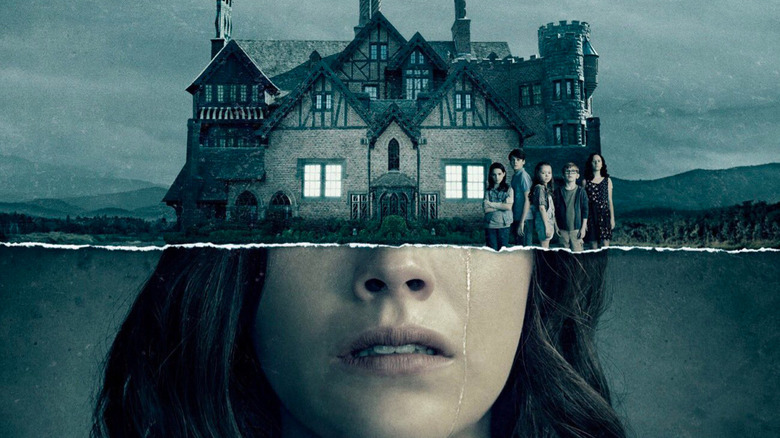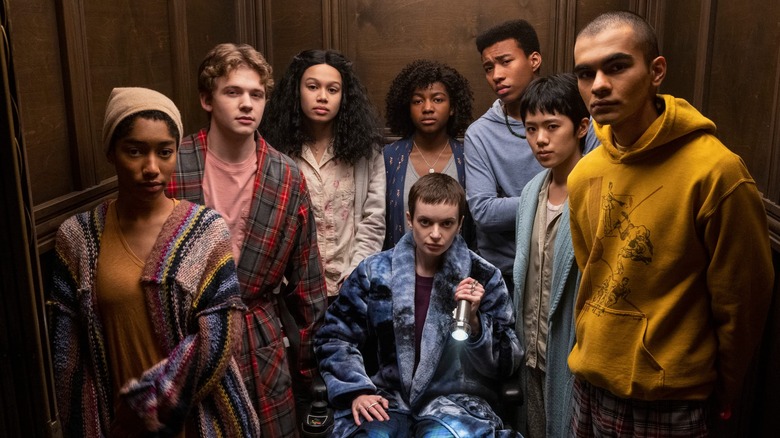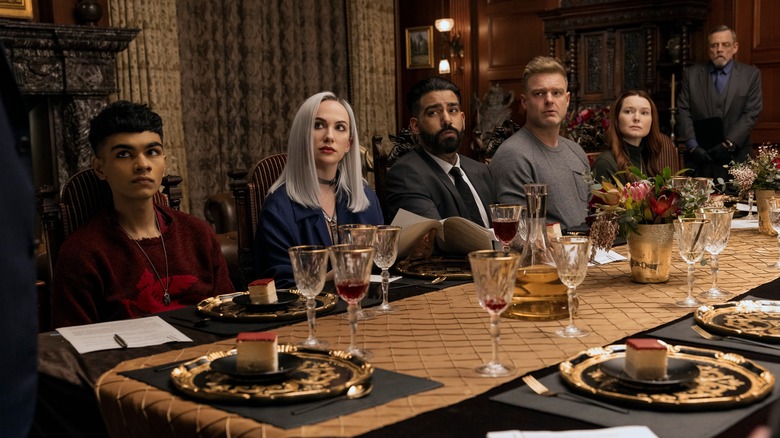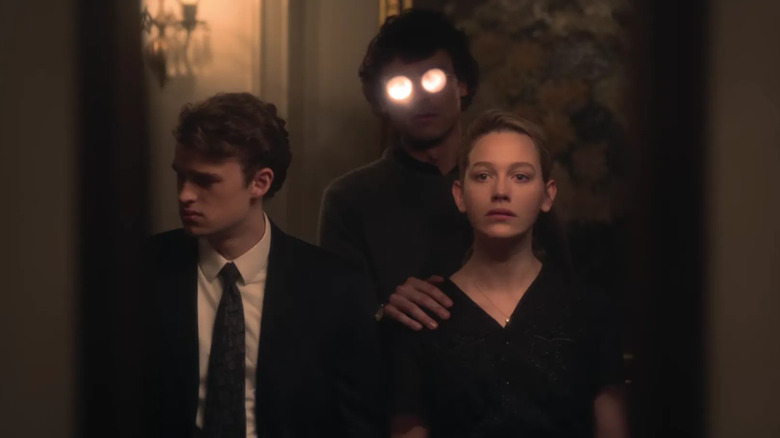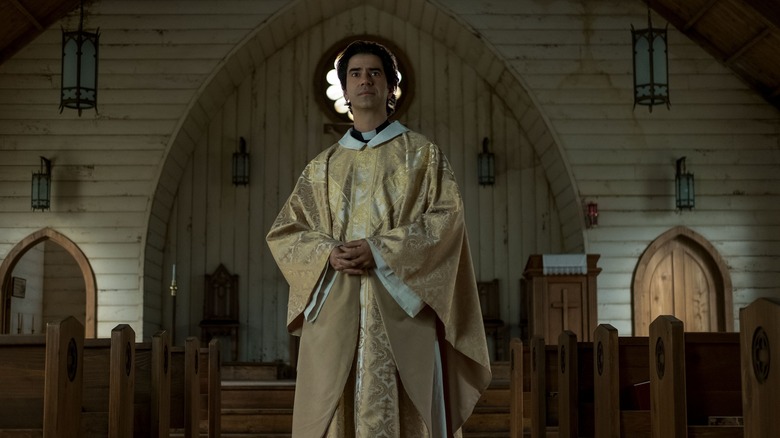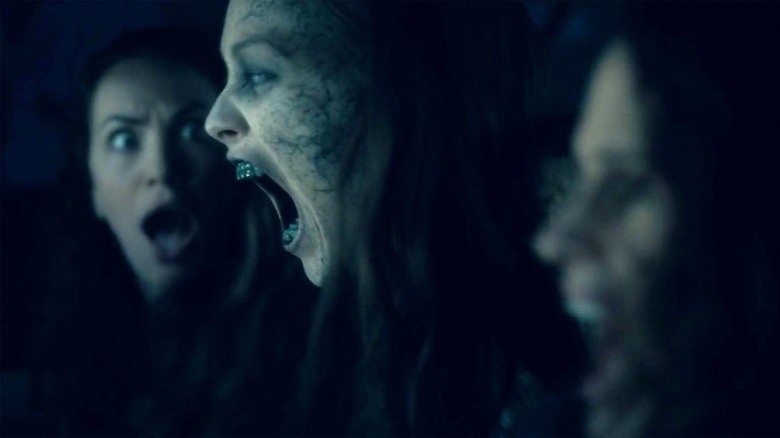The Mike Flanagan Netflix Horror Shows, Ranked
Gather around, children, and I shall tell you all about the horrors of generational trauma! Mike Flanagan ("Doctor Sleep" and so much more) has created his own little Netflix universe with a series of horror shows that share several cast members as well as several themes, specifically the idea of familial trauma being passed down through the ages and being intertwined with the supernatural.
Flanagan's latest (and by all accounts, final) Netflix series is "The Fall of the House of Usher," a spookshow heavily inspired by the works of the Godfather of Goth himself, Edgar Allan Poe. Like most of Flanagan's Netflix horrors, family tragedy plays a big part in the storytelling, which begs the question: How does "Usher" stack up when compared to what's come before? That's where this list comes in handy, as I've set out to rank Flanagan's five Netflix shows from worst to best.
To be clear, almost all of these shows (with the exception of one; we'll get to that in a moment) are worth your time. Flanagan has a distinct style of storytelling that's easy to latch onto, and at this point, you're either on board with his recurring themes or you're not. Me? I'm in the tank for Flanagan's work, so I'm always up for talking about the horrific worlds the filmmaker has created.
The Midnight Club
Oh boy, let's get this out of the way, shall we? Remember a few moments ago when I told you that all of the Flanagan Netflix shows are worth watching except one? Yeah, this is the one. On paper, "The Midnight Club" sounds like a great idea! It's Flanagan and company adapting the crazy works of YA horror master Christopher Pike! The story follows a group of terminally ill young adults living in a hospice facility where nothing is as it seems, and death lurks around every corner. To pass the time, the characters gather late at night and tell each other scary stories.
Unfortunately, the show is peppered with annoying characters, the scares just aren't there, and the sheer insanity of Pike's books is nowhere to be found. Pike's stuff is weird, man, and shunning that weirdness for generic thrills and chills makes for a rather lackluster series. Unlike the other Flanagan shows, this was meant to continue on into a second season — but that second season will never happen; Netflix pulled the plug. And I'd argue that's for the best. "The Midnight Club" is a rare Team Flanagan misfire. I can see myself revisiting every other show on this list, but not this one.
The Fall of the House of Usher
The latest (and last?) Flanagan Netflix series is a bit hit or miss. Drawing on the works of Edgar Allan Poe, Flanagan's "The Fall of the House of Usher" follows the gruesome downfall of an obscenely wealthy family of miscreants who made a killing in the pharmaceutical industry. While the saga that unfolds is plenty compelling, it's not particularly scary, and that feels like a problem. Sure, there are plenty of ghastly moments involving bloody deaths, but the gothic horror that's so prevalent in Poe's work is nowhere to be found here. Part of the problem is that the story is ultra-modern, and modernity doesn't really suit Poe's writing — it's very much of a certain time and place, and transporting it to the 21st century doesn't quite click. Still, it's fun to have Flanagan's usual line-up of players all together again for another tale of terror, just in time for spooky season.
The Haunting of Bly Manor
After drawing on Shirley Jackson's "The Haunting of Hill House," Flanagan followed things up with another classic haunted house story: "The Turn of the Screw" by Henry James. But Flanagan didn't stop there — the show, "The Haunting of Bly Manor," draws on multiple stories penned by James, all wrapped up in the "Turn of the Screw" scenario of a nanny (the wonderful Victoria Pedretti) who gets a gig watching over two mischievous children residing in a sprawling, potentially haunted mansion. There's plenty to love here, including a heartbreaking tragic romance. But "Bly Manor" is also a touch disjointed — unlike "Hill House," Flanagan doesn't direct every episode, and that lack of one person steering the ship shows through the material. Still, Flanagan knows what he's doing here, and if the final episode doesn't make you cry your eyes out, you might be emotionally dead inside. Just saying.
Midnight Mass
There are many who will say "Midnight Mass" is the best thing Flanagan has done, and trust me, it came very close to being number one on this list. Very close, but not quite close enough. No matter — "Midnight Mass" is a major achievement; a meditation on faith and grief that feels like the best novel Stephen King never wrote. Flanagan, who directed the entire series from start to finish, uses vampires as a catalyst to spin a tragic, creepy story of a small community that succumbs to religious fervor. Hamish Linklater is phenomenal as a priest who comes to town and shakes things up, commanding the screen with his calm yet commanding voice. A true ensemble piece, "Midnight Mass" does a wonderful job conveying the ins and outs of its small community, and it's easy to sympathize or at least empathize with the characters, even when they make truly bad decisions.
This series is also a showcase for one of Flanagan's favorite storytelling devices: the monologue! And while some may take issue with the speechifying that goes on here, two different monologues in which two characters discuss, at length, what they think happens when they die are so beautiful and so poetically devastating that they reduced me to wracking sobs the first time I watched the show. Maybe I should've made this number 1 after all.
The Haunting of Hill House
Yep, "The Haunting of Hill House" is still number one. It's the encapsulation of everything Flanagan does so well; a heartbreaking, scary, emotional saga about family, and pain, and loneliness. It's a singular work that aches with a raw, honest, beating heart, and it takes my breath away. Sure, you can take issue with the fact that Flanagan screws around with Shirley Jackson's unbeatable subject matter — he draws out a surprisingly happy ending, something that's nowhere to be found in Jackson's chilling masterpiece.
But if you can overlook that, and I know I can, you'll find the tragic story of the Crane family as they deal with life, and loss, and, yes, ghosts. Everyone here is haunted, be it by literal specters or by the shadows of their wrenching past. At the center of it is Victoria Pedretti again, who is something of a revelation here playing the tragic, doomed Nell, whose death kicks the entire story into gear. What happens to Nell is almost too traumatic to comprehend, and the traumatic nature of her story is the framework on which Flanagan hangs the narrative. I like the other Mike Flanagan shows (especially "Midnight Mass"), but none of them have come close to breaking my heart and blowing my mind the way "The Haunting of Hill House" did. Flanagan hasn't been able to top this, but that's no surprise — it's hard to recreate perfection.
